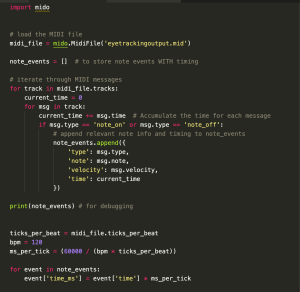This week I worked on my ethics assignment, spent some time with my teammates processing the feedback we got from staff regarding our design report, worked on my MIDI to firmware conversion code, and devised some small-scale testing plans to ensure the components we ordered will work correctly.
Initial components testing
I am waiting for some more components (for the solenoid control circuitry) to arrive this week. Once they do, I will probably spend an evening running tests such as the following:
Test the Solenoid
- Activation Test: Connect the solenoid directly to the power supply and confirm it activates within the specified current range.
- Power Consumption: Measure the actual current draw and compare it with specifications.
- Thermal Testing: Run the solenoid for an extended period and monitor for any significant heating to ensure it can sustain operation without overheating.
- Measure any delays in reaction time
Test flyback diode reliability
- With the diode installed, use an oscilloscope to measure voltage at the MOSFET drain (or across the solenoid) when the circuit is deactivated. Take note of the voltage spike when switching off power to the solenoid and note how effectively the diode suppresses back EMF.
- One piece of feedback I received from the design report on a section I wrote was that the equation I used for energy dissipation wasn’t extremely necessary to include and rather I should have included a Vspike equation to quantify the back-voltage. I agree with this feedback, and when I run physical tests I will take note of the Vspike and how that may affect other quantities; I will include this in the final report.
Test the MOSFET
- Switching Test: Use a low-frequency signal from the function generator to control the MOSFET, checking that it switches the solenoid on and off without issues.
- Thermal Stability: Measure temperature over a few switching cycles. Confirm that the MOSFET consistently stays within a safe temperature range
My progress on MIDI to firmware conversion code
I have gotten a grasp on how to parse MIDI with Python’s Mido library to extract note events. I am also able to generate C-compatible data to output an array of structs in a C header file. I will keep fine-tuning this as necessary and this week I will also work on writing the final “integration” code, as in, using the C array to send commands from the STM32 to actuate the solenoids. I have attached a screenshot of some of my code.

I am on schedule. I hope to have the bulk of my components testing finished this week as well as a bare-bones functioning midi-to-firmware conversion code (I want it to function save for any edge cases, minor bugs, etc). I will also be working more on the ethics assignment this week after having pod discussion in lecture.
